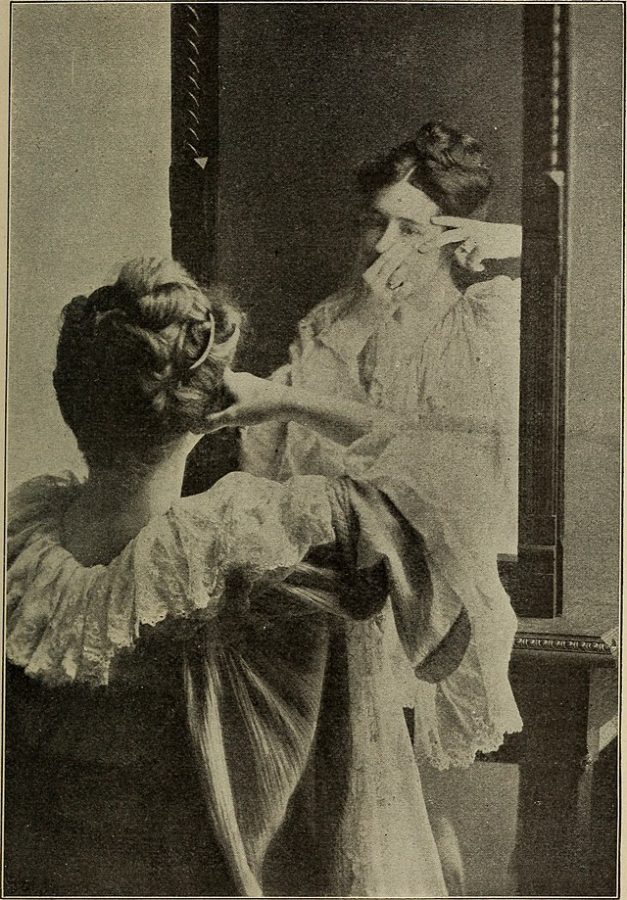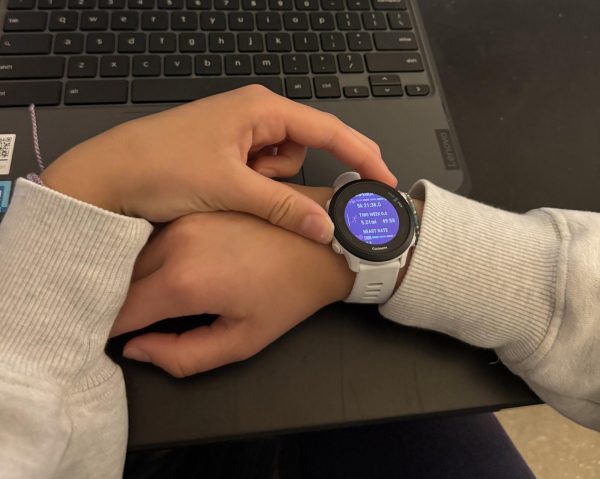Artificial wellness: The commodification of consumer self-care
Photo used with permission from Wikimedia Commons
A woman in 1904 practices early skincare in the mirror.
In February, HBO’s most talked about series, Euphoria, returned to screens for season two. The show is especially popular among students, centering a group of high schoolers and their struggles. One character in the group is Cassie Howard, played by Sydney Sweeney, whose storyline focuses on her self-destructive desire to be loved. This desire leads to a “self-care” scene in episode five, in which Cassie begins a pattern familiar to students in the real world. She begins waking up at four in the morning to get ready for school, spending hours each morning on an ominously rigorous skin and hair care routine, all for the attention of Nate Jacobs, another problematic character in the universe.
Despite the show’s dramatization of the infamous self-care routine, students thought the scene reflected a real issue brought about by cultural obsession with self-care.
Junior Sophia Kim said the routine was “self-destructive and indicative of how strongly teenage girls are socialized to rely on male validation.”
Sophomore K Shabardina agreed, saying, “Cassie’s routine was never actually self-care. She wasn’t doing it for herself, she was doing it to become perfect for someone. What she was doing was definitely self-destructive. In this episode we can see how she is losing herself and becoming someone else, someone completely different from the real her. Does that make her happy in the end? No.”
Junior Joyce Yang had a different perspective, however. “I see it as self-care. As in it’s the only way she knows how to console herself. To me, she’s getting increasingly obsessive over her physical appearance if only to ‘make up’ for the wreck she is internally because it’s all she’s been conditioned to attribute her self worth to. I loved this episode so much because it’s such an accurate portrayal of how damaging the culture of pairing the entirety of a woman’s being to her face value is, especially for teenage girls,” Yang said.
It is evident that Cassie’s routine was an attempt to draw in love and attention by way of improving her physical appearance, but if love is something she felt she needed, wasn’t she caring for herself in doing so?
Underlying these differences in perspective, there seems to be a fundamental disagreement about the definition of self-care.
In recent years, as open discussion surrounding mental health has grown, self-care has moved to the forefront of public consciousness. Self-care has always been essential, but the need for it has been exacerbated under the stress and isolation of the pandemic, and Google Search Trends show a 250% increase in self-care related searches between 2019 and 2020, a trend that has continued steadily upward since. As it’s risen in popularity however, the term has spread online like wildfire, taking on so many different meanings that it’s difficult to decipher what the concept is at all.
Self-care is a concept with ancient roots, dating back to the 5th Century B.C.E. when ancient Greek philosopher Socrates was credited with creating the movement. For the sake of this article, self-care will be defined by the philosophy of its founder. Socrates’ core belief was famously that our true self is the soul. He believed that ‘care of self’ and to ‘know thyself’ are fundamental principles regarding the healthy relationships we have with ourselves and others. Self-care, then, is the decisive and conscious action of behaving in alignment with who we truly are and treating ourselves with the attention, kindness and respect we deserve. The Greek word for ‘care’ would have been understood to include meditation, prayer, education and exercise.
Here is where self-care in its traditional sense differs from modern applications of the term. In recent years, brands, especially in the beauty industry, have used the guise of “self-care” to profit off of consumers’ sense of self-worth and commodify the term. Self-care, which was once the mindful practice of an individual restoring a healthy relationship with themself, has become a $450 billion industry. In a time when mental health issues are both widespread and widely discussed, the demand for products that claim to promote mental wellness has skyrocketed.
Self-care as a marketing strategy is everywhere, from skincare products like the jade face roller featured in Cassie’s manic routine (which Sephora describes on its website as “relaxing and de-stressing”), to Goop by Gwyneth Paltrow, to Oreo manufacturer Mondelēz’s “mindful snacking” campaign. This is not to say that these brands don’t have good intentions in promoting self-care. Schieber Research founder and CEO Hamutal Schieber said for Forbes in December that “helping consumers in their journey to become healthier and happier provides a great opportunity for brands to create real value.”
The issue with the self-care industry, however, is just that. Self-care is the personal practice of self-restoration. It is not an industry. There are plenty of self-care tips online that emphasize the importance of eating well, exercising, sleeping, going outside and drinking water. These practices are essential, and it is impossible to truly practice self-care without them. However, many seem to believe that the absence of these practices is what causes mental health issues, when in reality, mental health issues like anxiety and depression are often what make tasks like these extremely difficult.
What the self-care industry does is provide so-called quick-fixes that provide immediate gratification while ignoring biological and psychosocial issues underlying mental health issues. In cases like Cassie’s, beauty products marketed as ‘self-care’ can exacerbate self-image issues and worsen pre-existing mental health conditions in the long-term, even if they provide gratification in the short-term. So, for neurotypical people and those who are already mentally well, “self-care” products may be pleasant ways to treat yourself and feel cared for. But that raises two issues:
One – Treating yourself is great, and it feels good, but it is not the same as self-care. Self-care and pleasure are two different things. One is active, restorative practice that prioritizes long-term wellness and is different for every person. The other is short-term gratification.
Two – Are neurotypical people and those who are already mentally well really the target audience for self-care brands and products? No. The self-care industry profits from the drive that mental illness causes for an easy solution. And when mental illness remains unresolved after trying one “self-care” product, consumers are likely to try another.
Self-care is not universal. It looks different for everyone. Of course, necessities like food, water, exercise, sleep and time outside are essential to care for yourself, but depending on who you are and where you’re at, those may seem too far out of reach right now. That’s OK. Start by taking whatever small steps you can to get there, even if it’s as simple as getting out of bed and brushing your teeth in the morning, or opening your blinds to make sure you see natural light every day. No matter what you’re doing, make sure you’re doing it for yourself. Listen to your body and mind, and if you think you need extra support to get to a place of healthy self-care, ask for help instead of relying solely on yourself. In the absence of community care, self-care is insufficient.
Your donation will support the student journalists of Thomas S. Wootton High School. Your contribution will allow us to purchase equipment and cover our annual website hosting costs.
Senior Isaac Muffett is the opinions editor in his fourth year on the Common Sense staff. When he's not writing or researching, he spends his free time...







